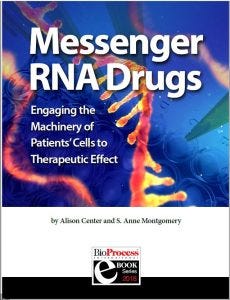Messenger RNA Drugs: Engaging the Machinery of Patients' Cells to Therapeutic EffectMessenger RNA Drugs: Engaging the Machinery of Patients' Cells to Therapeutic Effect
 Although most of the bioprocess industry has focused on process development for large-molecule formulations (e.g., protein drugs), a growing segment of the industry has been concentrated on other types of biotherapeutics to leverage advances in understanding of immunology and genetic engineering. Such technologies may emerge both as tools for drug manufacturing and at some point, as biopharmaceuticals, biotherapeutics, vaccines, and cell and gene therapies, themselves. What brings mRNA research to BioProcess International’s attention is the increasing interest turned toward therapeutic applications, as explored in this review of current work toward that goal.
Although most of the bioprocess industry has focused on process development for large-molecule formulations (e.g., protein drugs), a growing segment of the industry has been concentrated on other types of biotherapeutics to leverage advances in understanding of immunology and genetic engineering. Such technologies may emerge both as tools for drug manufacturing and at some point, as biopharmaceuticals, biotherapeutics, vaccines, and cell and gene therapies, themselves. What brings mRNA research to BioProcess International’s attention is the increasing interest turned toward therapeutic applications, as explored in this review of current work toward that goal.
Discovered in 1961, messenger RNA (mRNA) currently is being explored both for ex vivo use through readministering transfected cells to a patient as an immunotherapy; and for direct in vivo therapeutic delivery/vaccination. The latter application would use mRNA to create desired proteins within a patient’s body rather than in bioreactors and fermentors for later delivery. Potential indications include some protein-replacement approaches and
genome engineering, genetic reprogramming, immunotherapies based on T cells and dendritic cells (DCs) to treat cancer and infectious diseases (ex vivo) — as well as direct in vitro transfusion (IVT) applications in oncology and infectious diseases, tolerization regimens to treat allergies, and other protein-replacement therapies (2). In preclinical and clinical applications, mRNA is being explored for cancer immunotherapies; vaccines against infectious diseases such as influenza, tuberculosis, respiratory syncytial virus (RSV), tick-borne encephalitis, human immunodeficiency virus (HIV), and others; vaccines to alleviate allergies; protein-replacement therapies (for heart and lung diseases, autoimmune diseases, and some diabetes complications), reprogramming of cell fates, and genome editing (2).
Although most of the bioprocess industry has focused on process development for large-molecule formulations (e.g., protein drugs), a growing segment of the industry has been concentrated on other types of biotherapeutics to leverage advances in understanding of immunology and genetic engineering. For example, work toward development of cell and gene therapies (and other approaches to personalized medicine) and recombinant vaccines all leverage technologies that traditionally might have been thought of as more research-based than actively biotherapeutic in nature. Such technologies may emerge both as tools for drug manufacturing and at some point, as biopharmaceuticals, biotherapeutics, vaccines, cell and gene therapies, themselves. What brings mRNA research to BioProcess International’s attention is the increasing interest turned toward therapeutic applications at our company’s annual TIDES conference — as well as a statement by Moderna Therapeutics President Stephen Hoge that such applications could be used to direct human cells to create therapeutic proteins in vivo. He stated that “you could ultimately use mRNA to express any protein and perhaps treat almost any disease. It is almost limitless what it can do” (3).
Just fill out the form below to download this exclusive eBook now!
You May Also Like






